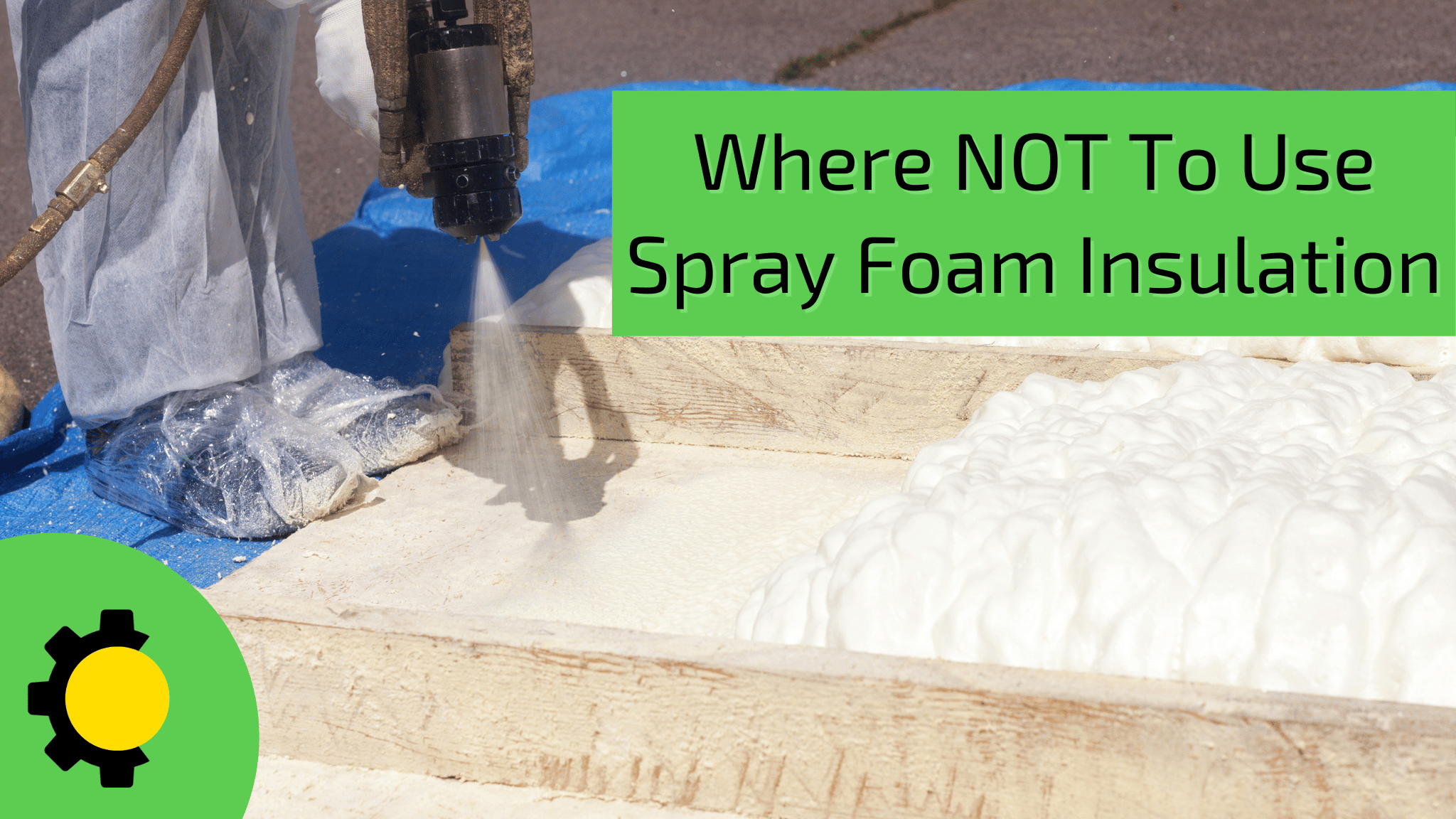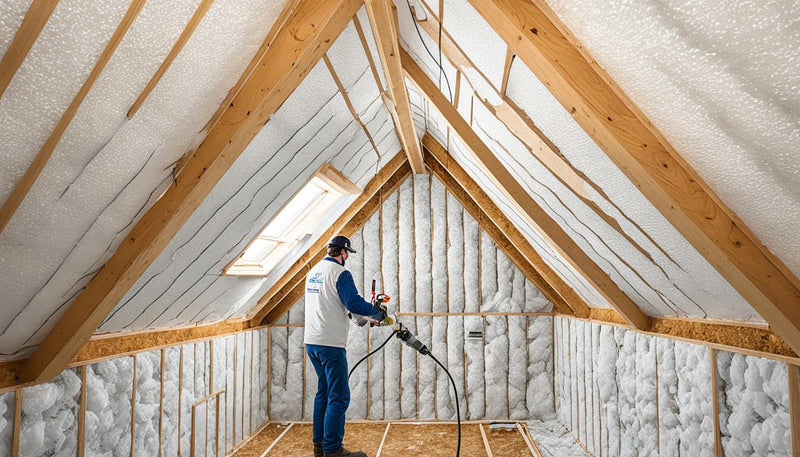The Environmental Impact of Spray Foam: Sustainability Considerations
The Environmental Impact of Spray Foam: Sustainability Considerations
Blog Article
Top Factors to Choose Spray Foam for Your Following Insulation Project
When thinking about insulation alternatives for your next job, spray foam stands out due to its remarkable performance characteristics and efficiency benefits. As you weigh your choices, exploring the versatile applications and long-term benefits of spray foam might expose compelling reasons to incorporate it into your insulation approach.
Superior Insulation Efficiency

The high R-value of spray foam, which measures its thermal resistance, is one more essential benefit. Closed-cell spray foam, for circumstances, can attain an R-value of up to 6.5 per inch, considerably outshining fiberglass batts and cellulose. Spray foam insulation creates a closed seal, which reduces thermal bridging and decreases the potential for mold development due to moisture buildup.

Energy Efficiency Benefits
The energy efficiency benefits of spray foam insulation are significant, additional boosting its appeal as a leading choice for developing insulation. Among the key benefits is its superior thermal performance. Spray foam broadens upon application, developing an impermeable seal that minimizes air leakages, which is an usual resource of power loss in typical insulation products. By effectively reducing thermal bridging, it maintains a regular interior temperature, thus reducing heating and air conditioning expenses.
Furthermore, spray foam insulation flaunts a high R-value per inch, which implies it offers a lot more thermal resistance in less space compared to choices like fiberglass or cellulose (Spray Foam). This effectiveness not just adds to prompt energy savings however likewise advertises long-term sustainability by minimizing the total energy consumption of a building
In addition, the implementation of spray foam can qualify home owners for power efficiency motivations and tax obligation credits, adding financial benefits to its energy-saving abilities. In an age where power preservation is vital, picking spray foam insulation not only improves convenience yet additionally aligns with ecologically accountable techniques, making it a prudent selection for both commercial and property jobs.
Dampness and Mold Resistance
Provided its unique make-up and application method, spray foam insulation provides extraordinary dampness and mold resistance, making it an optimal option for different environments. The closed-cell framework of spray foam produces a solid barrier that effectively secures off possible dampness access, therefore decreasing the possibility of mold and mildew growth. Unlike traditional insulation products, which can take in water and offer a breeding place for mold and mildew, spray foam stays invulnerable to wetness, enhancing the overall health of the interior setting.
Additionally, the application procedure of spray foam involves expanding and loading voids and fractures, ensuring a limited seal that lessens air leaks. This characteristic not just enhances energy efficiency but additionally assists control humidity degrees within the area. Appropriate moisture control is important for avoiding mold and mold, making spray foam insulation especially advantageous in locations susceptible to wetness, such as cellars and crawl rooms.
Along with its moisture-resistant homes, spray foam is also naturally resistant to mold and mildew growth. This particular makes sure that homes and buildings remain healthy and balanced and risk-free over time, giving comfort to homeowners and structure supervisors alike.
Long-Term Expense Savings
Spending in spray foam insulation returns considerable long-term expense financial savings, mainly via enhanced power this post efficiency. Unlike standard insulation materials, spray foam produces an impermeable seal that reduces air leak. This reduction in drafts causes lower heating & cooling costs, as a/c systems do not have to work as difficult to keep comfortable interior temperature levels.
Furthermore, the remarkable shielding homes of spray foam suggest that homes stay constantly comfy year-round, reducing reliance on energy-consuming home appliances. Gradually, these financial savings can accumulate, leading to a recognizable decrease in utility expenses.
Furthermore, spray foam insulation adds to the longevity of your home's structure by avoiding wetness build-up and mold and mildew growth, which can bring about pricey repairs. With its sturdiness and resistance to resolving, spray foam keeps its performance over the years, ensuring that the initial financial investment remains to repay.
Essentially, choosing spray foam insulation not only enhances your home's energy efficiency yet additionally converts right into considerable long-lasting monetary benefits, making it a smart investment for homeowners looking to reduce costs while improving convenience and sustainability.
Versatile Application Alternatives
Many application choices make spray foam insulation an extremely versatile choice for a variety of structure navigate to this site tasks (Spray Foam). This flexibility enables it to be efficiently utilized in residential, business, and industrial settings, satisfying varied insulation requirements
Spray foam can be applied in attic rooms, wall surfaces, crawl spaces, and also roofings, providing smooth protection that eliminates gaps and gaps where air leakages typically occur. Its capacity to broaden upon application ensures a limited seal, which is vital for energy efficiency and dampness control.
Furthermore, spray foam insulation is readily available in different formulations, consisting of open-cell and closed-cell types, permitting tailored remedies based on specific job requirements. Open-cell foam is lighter and far better fit for soundproofing, while closed-cell foam offers remarkable insulation and structural honesty, making it optimal for locations subjected to dampness.
In addition, spray foam can be used in hard-to-reach spaces, boosting its suitability for retrofitting existing frameworks. With the capability to abide by different substratums, consisting of metal, concrete, and wood, spray foam insulation sticks out as a versatile choice that satisfies the needs of modern building techniques.
Conclusion
In final thought, spray foam insulation arises as a premium option for insulation projects due to its extraordinary thermal resistance, power effectiveness, and ability to create airtight seals that avoid moisture and mold growth. The long-term price financial savings connected with lowered energy costs additionally improve its allure. Furthermore, its versatility in application across various settings emphasizes its functionality and performance. Choosing spray foam insulation ensures an extensive option that satisfies the demands of modern-day building click to investigate and construction and power performance requirements.
When it comes to attaining ideal energy effectiveness in industrial and residential structures, spray foam insulation stands out for its superior insulation efficiency.The energy effectiveness benefits of spray foam insulation are considerable, more improving its allure as a top selection for developing insulation.Spending in spray foam insulation yields substantial long-lasting cost financial savings, primarily via improved power efficiency.In final thought, spray foam insulation arises as an exceptional alternative for insulation projects due to its phenomenal thermal resistance, energy performance, and ability to produce impermeable seals that avoid dampness and mold growth. Picking spray foam insulation guarantees a thorough service that fulfills the demands of modern building and construction and energy effectiveness criteria.
Report this page